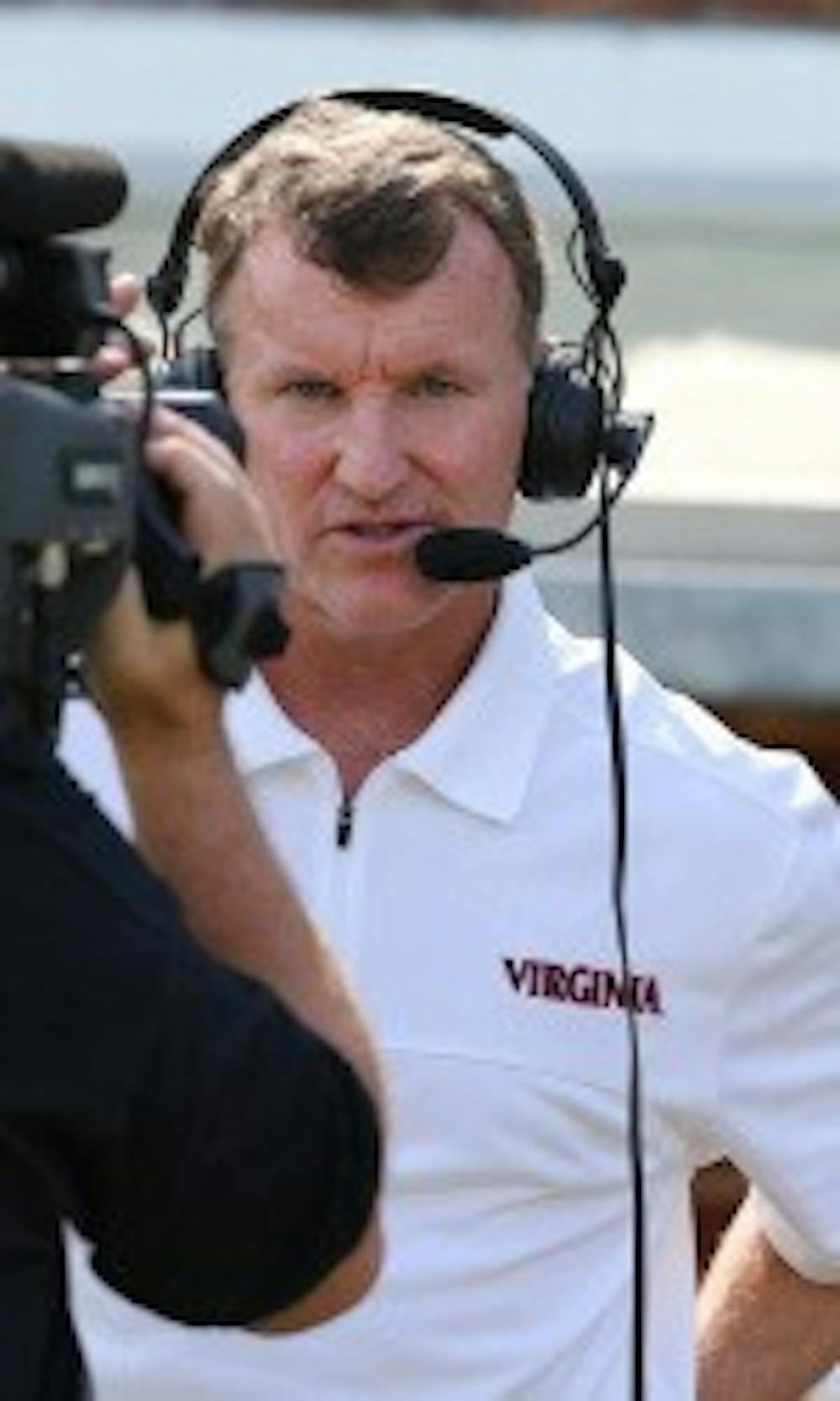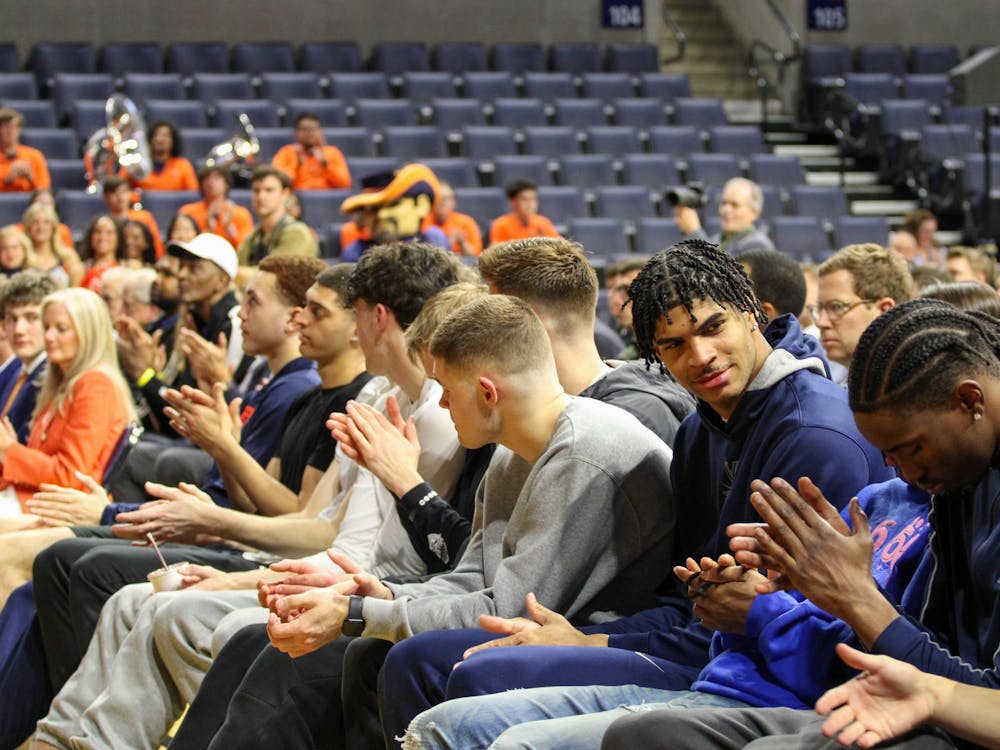When women’s soccer coach Steve Swanson was growing up, he was a multi-sport athlete. At his high school in Michigan, he played soccer, basketball and baseball. But Swanson enjoyed playing basketball especially.
“I loved basketball,” Swanson said. “I think that if I was a little taller or my hands were a little bigger, I’d still be in basketball.”
But a professional basketball career wasn’t in the cards for Swanson.
“Obviously, when you look at me, I’m not tall,” Swanson said.
A middle school teacher led him to soccer. After graduating high school, Swanson started to play soccer more and more and fell in love. He walked on to the men’s soccer team at Michigan State, where he was the team’s leading scorer, captain and a regional All-American in his final year.
Fast-forward through a professional career, three highly successful college coaching stints and several coaching positions with the U.S. Women’s National Team, and Swanson is in his office at Virginia, looking at film before the match against Boston College.
“I’ve never gone to work a day in my life. It’s always been — I’m going to play,” Swanson said. “My wife would tell you a little differently. Coaching is a lot of hours.”
Swanson has dedicated much more than mere hours to his coaching career so far — he has been a collegiate head coach for 26 years. Somehow he manages to balance his head coaching job at Virginia with his position as the head coach of the U-23 U.S. Women’s National Team. 2015 was one of Swanson’s busiest years — he led the Cavaliers to an ACC regular season championship and helped lead the U.S. Women’s National Team to a World Cup as an assistant coach.
“I try to be balanced, but I don’t think I’m very good at it,” Swanson said.
His résumé may beg to differ. Since 1990, Swanson has risen to the elite ranks of collegiate soccer coaches. He has led his teams to 25 consecutive winning seasons, 21 NCAA Tournament appearances and seven conference championships.
Before arriving at Virginia in 2000, Swanson coached at Stanford and Dartmouth. He helped Dartmouth emerge on the national stage, and led the Cardinals to two Pac-10 titles.
Swanson used an analogy to describe his learning experience at Stanford.
“If you [have] ever fished, sometimes you get the reel and you get it all messed up … And for two years, I needed to straighten it all out,” Swanson said. “The first couple of years were a little hard. That was all good experience for me … You challenge your philosophies and see how it works.”
Obviously Swanson has since found a functional philosophy. In his 16 seasons at Virginia, he has made a lasting impact — leading his teams to a 254-76-38 record, good for the highest winning percentage in program history.
Swanson has also moved up through the ranks in U.S. women’s soccer. Currently the head coach of the U.S. U-23 team and an assistant coach for the full national team, he led the U-20 team to the FIFA Under-20 World Cup title in 2012. His experience in national soccer is extensive — Swanson has coached the U-16, U-17 and U-18 national teams.
Even with all of his success leading teams, Swanson manages to focus on each of his players. Player development is where he thrives — 28 of his players are All-Americans and 31 have played professionally. It’s his players’ development — not the wins and the championships — that Swanson is most proud of.
“For me at the end of the game … Where did the players perform, and did each player get better that day?” Swanson said. “If you can see some tangible evidence in the games of them learning and taking some of the things you’re trying to teach them into the game — that’s most gratifying to me.”
For Swanson, his favorite moments are when he can see his players come to full potential. He puts in hours of individual work with his players on the collegiate and national level.
“There are games that stand out, you know, but there are other things that stand out to me like players embracing their role and doing something that they didn’t think they could have done maybe a year earlier, or just watching the improvement of a player over a year, or just having some random act of unselfishness,” Swanson said.
One player he has gotten to work with individually on multiple levels is current U.S. Women’s National Team member Becky Sauerbrunn. Swanson coached Sauerbrunn on the U-16 national team when she was just turning 15 years old, and later recruited her to play at Virginia. Their experience came full circle when Sauerbrunn won her first World Cup in 2015, and Swanson was on the sidelines as an assistant coach.
“It’s rare,” Swanson said. “Usually you get your players for four years and that’s that, so whenever you can get more than that — it’s a bonus.”
Sauerbrunn has developed into one of the best defenders in the country — winning NWSL Defender of the Year in 2013, 2014 and 2015. Swanson helped Sauerbrunn hone her defensive skills early on. One of Swanson’s analogies ultimately helped improve her play.
“For the longest time, I had so much trouble hitting a long ball. Day in and day out, we would do individuals, and he would break down every single concept to a long ball,” Sauerbrunn said. “He would relate it back to some sort of analogy. For my follow through, he would talk about a baseball swing, or the different golf clubs I had in my golf bag … For me looking back, that’s something that stands out.”
The effects of Swanson’s coaching ability — and his analogies — have stayed with Sauerbrunn throughout her career.
“Now on the senior team, I think back and I’m like, that was my driver,” Sauerbrunn said. “And that sticks with me. It’s funny because that has stuck for so long.”
However, the longevity of Swanson’s relationships with his players may outlast the endurance of his analogies.
“The reason I got into coaching is because of the relationships developed and interactions you have with the players on a daily basis,” Swanson said. “For me it’s about helping them reach their goals. For a lot of them, it’s helped them reach their dreams. And you’re doing it together.”
And if ever wondering how exactly Swanson seems to do it all — he attributes it to his support system at home.
“I’ll say this, if I’ve had any success in my career, its because of my family, and [my wife] in particular,” Swanson said.
However, Swanson’s definition of family doesn’t just extend to his immediate family members.
“I put a lot of value on the relationships I have with players once they leave here,” Swanson said. “I have two daughters and a son, but when you coach, you get — in my case — 500 daughters. And that’s a pretty cool thing.”
Sauerbrunn is just one of the 500 who understand the meaningful relationships Swanson creates with his players.
“He is always talking about the ‘sisterhood.’ We’re all sisters,” Sauerbrunn said. “It’s funny because we always make fun of him for saying ‘sisters.’ But it’s definitely something that he is responsible for creating and cultivating.”
Despite what Swanson claims, it seems he has his balancing act down — and is able to make profound impacts on his players in the process.
His biggest challenge?
Trying to keep up with popular music in his now 26-year long coaching career.
“I just need to make sure I keep up with the music. I don’t know the music of my players anymore,” Swanson said. “I used to think I knew all the songs a long time ago but I don’t know ... I’m losing touch. Twenty years ago I used to.”







